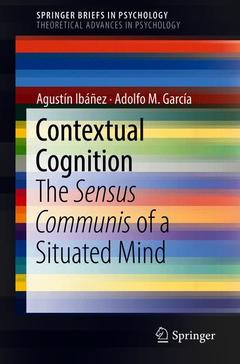Contextual Cognition, 1st ed. 2018 The Sensus Communis of a Situated Mind SpringerBriefs in Theoretical Advances in Psychology Series
Auteurs : Ibáñez Agustín, García Adolfo M.

This Brief introduces two empirically grounded models of situated mental phenomena: contextual social cognition (the collection of psychological processes underlying context-dependent social behavior) and action-language coupling (the integration of ongoing actions with movement-related verbal information). It combines behavioral, neuroscientific, and neuropsychiatric perspectives to forge a novel view of contextual influences on active, multi-domain processes. Chapters highlight the models' translational potential for the clinical field by focusing on diseases compromising social cognition (mainly illustrated by behavioral variant frontotemporal dementia) and motor skills (crucially, Parkinson?s disease). A final chapter sets forth metatheoretical considerations regarding intercognition, the constant binding of processes triggered by environmental and body-internal sources, which confers a sensus communis to our experience. In addition, the book includes two commentaries written by external peers pondering on advantages and limits of the proposal.
Contextual Cognition will be of interest to students, teachers, and researchers from the fields of cognitive science, neurology, psychiatry, neuroscience, psychology, behavioral science, linguistics, and philosophy.
Dr. Agustín Ibáñez has an outstanding track record in the fields of cognitive neuroscience, experimental psychology, and neurodegeneration research with over 100 ISI publications in the last five years, including published works in top-ten journals on neuropsychiatric research (e.g., JAMA Neurology, Nature Reviews Neurology, Neurology, World Psychiatry, Cortex) and cognitive neuroscience (e.g., Brain, Journal of Neuroscience, Scientific Reports, SCAN). After obtaining his PhD, Dr. Ibáñez specialized in electrophysiology at the Max Plank Institute for Brain Research (Germany), and did his postdoctoral studies in neuroscience at the Neuroscience Center of Cuba and in the Universität Heiderlberg (Germany). He is currently the Director of the Institute of Translational and Cognitive Neuroscience (INCyT, Argentina). In addition, he is an independent researcher at the National Scientific and Technical Research Council (CONICET), a researcher at the Universidad Adolfo Ibáñez (Chile), and an Associate Investigator of the ARC Centre of Excellence in Cognition and its Disorders (CCD, Australia). Since 2009, he has directed, co-directed, and evaluated more than 25 Masters, Ph.D., and postdoctoral research projects. He has received numerous prestigious international awards and grants, and has established international collaborations with centers of excellence such as the University of Heidelberg (Germany), the MRC Cognition and Brain Science Unit of Cambridge and the University of Edinburgh (United Kingdom), and the Universities of New York, Caltech, Chicago, and Wisconsin (USA), among others. His work has helped South American translational neuroscience by establishing a framework to engage basic scientists in translational projects through internships, workshops, Masters and Ph.D. programs; organizing educational activities for the medical community, focusing on cognitiv
Offers an innovative approach to cognitive neuroscience, emphasizing situated and integrative frameworks over mainstream isolationist and decontextualized approaches
Presents a joint analysis of two hot topics in contemporary cognitive neuroscience which are rarely discussed together: contextual social cognition and dynamic action-language coupling
Introduces two neurocognitive models supported by empirical evidence and pregnant with implications for clinical practice
Offers methodological and epistemological reflections on the construction of experiments and theoretical models of cognitive neuroscience, with an emphasis on the notion of "intercognition"
Date de parution : 06-2018
Ouvrage de 117 p.
15.5x23.5 cm
Thèmes de Contextual Cognition :
Mots-clés :
Contextual Cognition; Situated Cognition; Intercognition; Social Cognition; Affective Processing; Motor-Language Coupling; Social Context Network Model; Hand-Action-Network Dynamic; Language Embodiment Model; Translational Neuroscience; Behavioral Variant Frontotemporal Dementia; Parkinson's Disease



